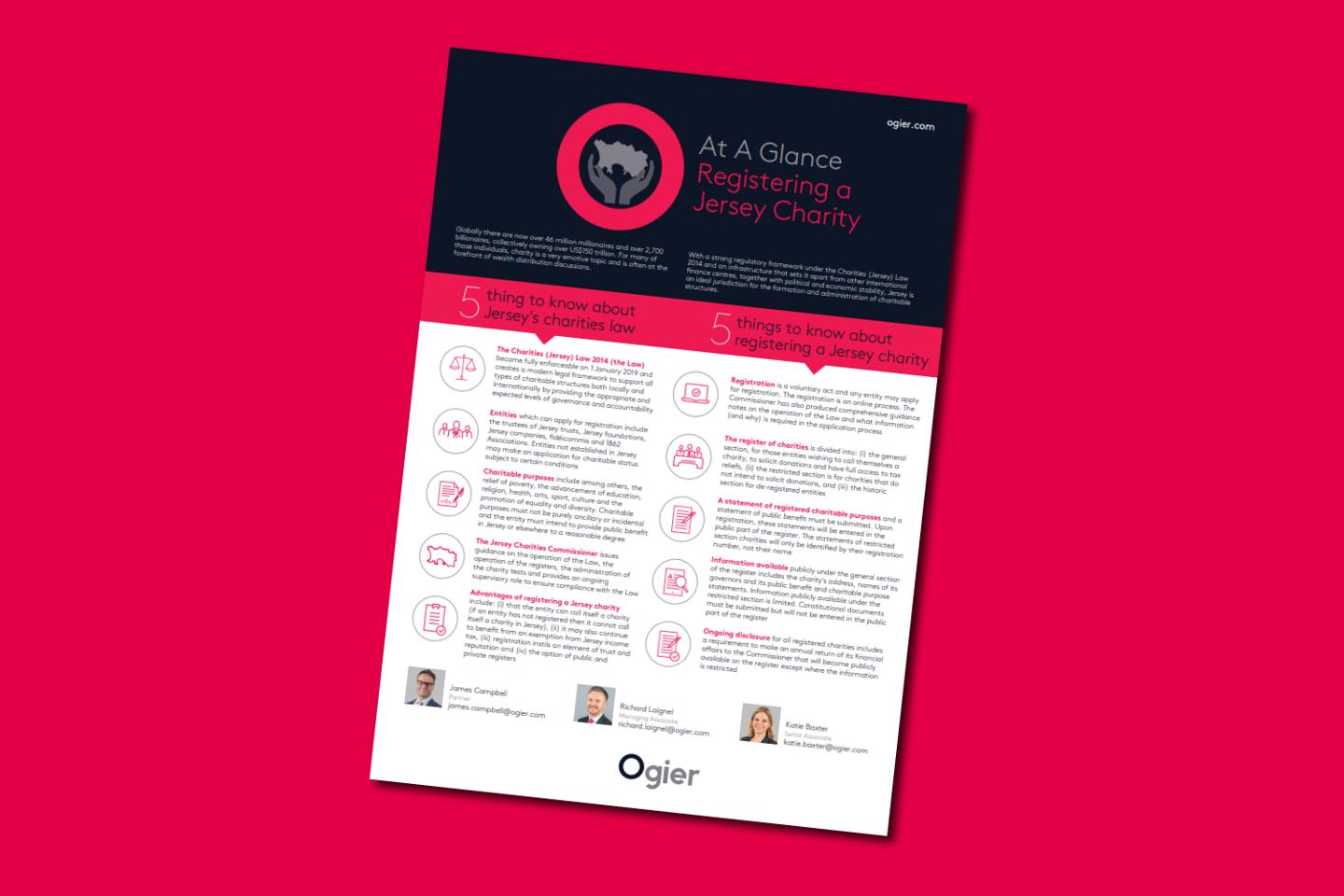
Richard Laignel
Managing Associate | Legal
Jersey

Richard Laignel
Managing Associate
Jersey
Big things are happening at Ogier. Change is embedded in everything we do. It is redefining our talent, our ways of working, our platforms of delivery, our culture.
Services
We have the expertise to handle the most demanding transactions. Our commercial understanding and experience of working with leading financial institutions, professional advisers and regulatory bodies means we add real value to clients’ businesses.
Sectors
Our sector approach relies on smart collaboration between teams who have a deep understanding of related businesses and industry dynamics. The specific combination of our highly informed experts helps our clients to see around corners.
We have the expertise to handle the most demanding transactions. Our commercial understanding and experience of working with leading financial institutions, professional advisers and regulatory bodies means we add real value to clients’ businesses.
Legal
Corporate and Fiduciary
Consulting
Banking and Finance
Corporate
Dispute Resolution
Employment law
Intellectual Property
Investment Funds
Listing services
Local Legal Services
Private Wealth
Property law
Regulatory
Restructuring and Insolvency
Tax
Banking and Finance overview
Asset Finance
CAYLUX Fund Finance
Debt Capital Markets
Derivatives
Fund Finance
Islamic Finance
Leveraged Finance
Listing services
Real Estate Finance
Regulatory
Restructuring and Insolvency
Structured Finance
Sustainable Finance
Corporate overview
Economic Substance
EIIS Services in Ireland
Equity Capital Markets
Insurance and Reinsurance
Listing services
Mergers and Acquisitions
Private Equity
Real Estate Structuring, Acquisitions and Disposals
Regulatory
Technology and Web3
Dispute Resolution overview
Banking Disputes
Corporate and Financial Services Disputes
Crypto Disputes
Enforcement of Judgments and Awards
Fraud and Asset Tracing
Funds Disputes
Insurance Disputes
International Arbitration
Regulatory
Restructuring and Insolvency
Section 238 Shareholder Appraisal Rights
Shareholder and Valuation Disputes
Trusts Disputes and Applications
Investment Funds overview
Hedge Funds
Managers and Sponsors
Private Equity
Real Estate, Infrastructure and Energy Funds
Regulatory
Sustainable Investing and Impact Funds
Technology and Web3
Local Legal Services overview
Cayman Local Legal Services
Channel Islands Local Legal Services
Ireland Local Legal Services
Employment law
Estate Planning, Wills and Probate
Expat services
Family Office
Intellectual Property
Make your Guernsey will online
Make your Jersey lasting power of attorney online
Make your Jersey will online
Notary public services
Relocating your business
Relocating your family
Property law
Accounting and Financial Reporting Services - Ogier Global
Cayman Islands AML/CFT training - Ogier Global
Corporate Services - Ogier Global
Debt Capital Markets - Ogier Global
Fund Services - Ogier Global
Governance Services - Ogier Global
Investor Services - Ogier Global
Ogier Connect - Ogier Global
Private Wealth Services - Ogier Global
Real Estate Services - Ogier Global
Regulatory and Compliance Services - Ogier Global
Our sector approach relies on smart collaboration between teams who have a deep understanding of related businesses and industry dynamics. The specific combination of our highly informed experts helps our clients to see around corners.
Ogier provides practical advice on BVI, Cayman Islands, Guernsey, Irish, Jersey and Luxembourg law through our global network of offices across the Asian, Caribbean and European timezones. Ogier is the only firm to advise on this unique combination of laws.
Keep up to date with industry insights, analysis and reviews. Find out about the work of our expert teams and subscribe to receive our newsletters straight to your inbox.
Fresh thinking, sharper opinion.
We get straight to the point, managing complexity to get to the essentials. Our global network of offices covers every time zone.
No Content Set
Exception:
Website.Models.ViewModels.Components.General.Banners.BannerComponentVm

ON THIS PAGE
RELATED
Globally there are now over 46 million millionaires and over 2,700 billionaires, collectively owning over $150 trillion. For many of those individuals, charity is a very emotive topic and is often at the forefront of wealth distribution discussions.
With a strong regulatory framework under the Charities (Jersey) Law 2014 and an infrastructure that sets it apart from other international finance centres, together with political and economic stability, Jersey is an ideal jurisdiction for the formation and administration of charitable structures.
The Charities (Jersey) Law 2014 (the Law) became fully enforceable on 1 January 2019 and creates a modern legal framework to support all types of charitable structures both locally and internationally by providing the appropriate and expected levels of governance and accountability.
Entities which can apply for registration include the trustees of Jersey trusts, Jersey foundations, Jersey companies, fidéicommis and 1862 Associations. Entities not established in Jersey may make an application for charitable status subject to certain conditions.
Charitable purposes include among others, the relief of poverty, the advancement of education, religion, health, arts, sport, culture and the promotion of equality and diversity. Charitable purposes must not be purely ancillary or incidental and the entity must intend to provide public benefit in Jersey or elsewhere to a reasonable degree.
The Jersey Charities Commissioner issues guidance on the operation of the Law, the operation of the registers, the administration of the charity tests and provides an ongoing supervisory role to ensure compliance with the Law.
Advantages of registering a Jersey charity include: (i) that the entity can call itself a charity (if an entity has not registered then it cannot call itself a charity in Jersey), (ii) it may also continue to benefit from an exemption from Jersey income tax, (iii) registration instils an element of trust and reputation, and (iv) the option of public and private registers.
Registration is a voluntary act and any entity may apply for registration. The registration is an online process. The Commissioner has also produced comprehensive guidance notes on the operation of the Law and what information (and why) is required in the application process.
The register of charities is divided into: (i) the general section, for those entities wishing to call themselves a charity, to solicit donations and have full access to tax reliefs, (ii) the restricted section is for charities that do not intend to solicit donations and (iii) the historic section for de-registered entities.
Statement of registered charitable purposes and a statement of public benefit must be submitted. Upon registration these statements will be entered in the public part of the register. The statements of restricted section charities will only be identified by their registration number, not their name.
Information available publicly under the general section of the register includes the charity's address, names of its governors and its public benefit and charitable purpose statements. Information publicly available under the restricted section is limited. Constitutional documents must be submitted but will not be entered in the public part of the register.
Ongoing disclosure for all registered charities includes a requirement to make an annual return of its financial affairs to the Commissioner that will become publicly available on the register except where the information is restricted.

Richard Laignel
Managing Associate | Legal
Jersey

Richard Laignel
Managing Associate
Jersey
Contact Richard
Back

Katie Baxter
Managing Associate | Legal
Jersey

Katie Baxter
Managing Associate
Jersey
Contact Katie
Back

James Campbell
Partner | Legal
Jersey

James Campbell
Partner
Jersey
Contact James
Back
Sign up to receive updates and newsletters from us.
Sign up
No Content Set
Exception:
Website.Models.ViewModels.Blocks.SiteBlocks.CookiePolicySiteBlockVm
